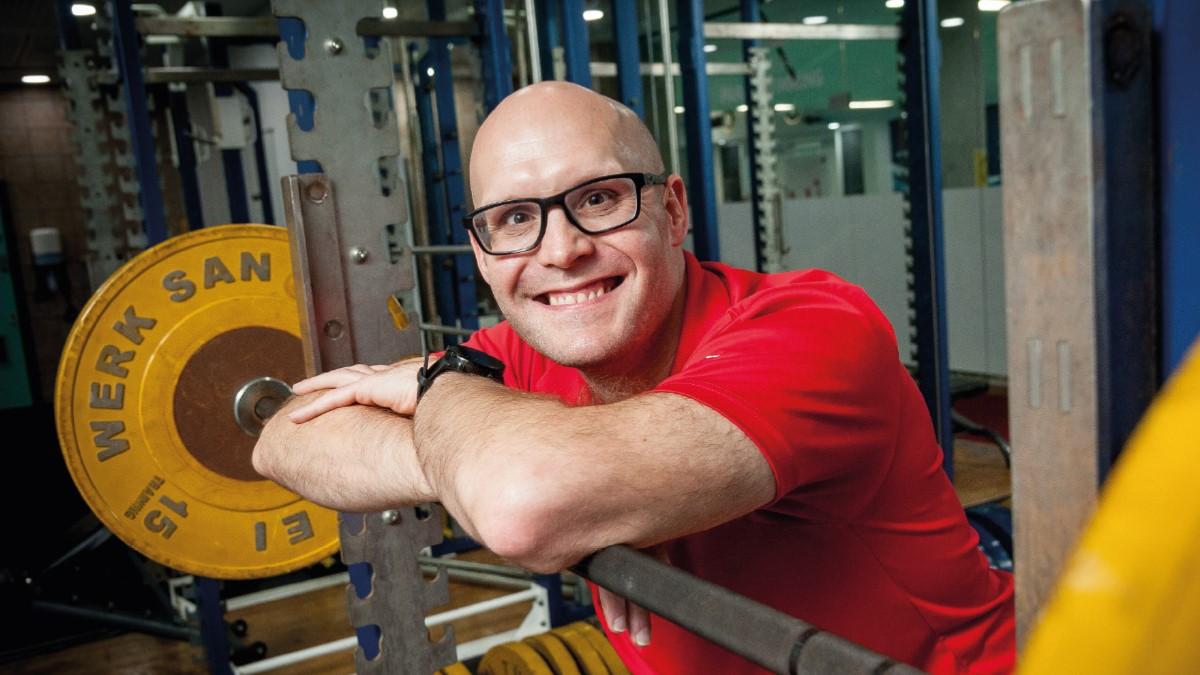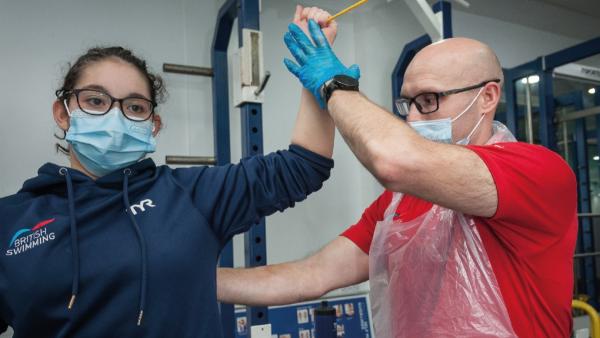Paralympic silver medallist turned physiotherapist Ritchie Barber on elite training, the limits of inclusivity, and how gaps in awareness could rob us of our future stars.

Our disabilities should not define who we are - we should be defined by what we do with them.
Physio to the Paralympics team with the biggest medal haul of Tokyo 2020 Ritchie Barber sums up his mantra in life – ‘smooth seas do not make skilled sailors - this has always rung true to me,’ he says.
Barber, British Para Swimming physiotherapy and athlete health lead, admits many of the waves have been caused by other people – whether kindly meant or not – setting limits on what he could do and who he could be.
Born with cerebral palsy (CP) this started when he was a toddler, and it was suggested to his parents that mainstream schooling may not be his best option.
‘However, my parents instinctively felt that mainstream school was the right choice and my disability was never an issue in primary school. This was not the case in secondary school, but after some initial struggles with bullying I found my feet, my desire to prove myself to others, and the will to progress through the education system the way I wanted to,’ Barber says.
‘I wanted to be a physio from the age of 16, so I viewed education as a way to level the playing field and studied with a competitive edge, not settling for second best.’
He made the decision to retire from swimming to focus on his physio degree only to find concerns being raised about his disability and fitness to practise. Coming early on, in his first student placement, when a clinical educator suggested that he might struggle with some of the more physical placements, this threatened to throw him off course.
‘It was quite unsettling,’ he admits. ‘I thought what right did anyone have to assume the outcome of my placement and my whole course within a few days of knowing me?
In fact, there was never a time during any of my placements where patients’ health and safety were at risk.
‘Fortunately, this only served to feed my desire to prove doubters wrong, although it did affect my self-esteem to some extent.’
He doubled down on his studies, graduating with first class honours, and to complete the picture, he married, and had ‘two great kids’.
Now he’s keen to use his success to help other athletes and physios with disabilities access opportunities.
Given the right circumstances and support, anybody can see abilities rather than disabilities – student or teacher, coach or swimmer,’ he says. ‘I developed my skills as a swimmer and a physio thanks to the people around me helping me to overcome the obstacles in my way.
And although I had many successes, there were also some failures along the way – but my environment allowed me to fail safely and learn from it.’
Making your own luck
Tenacity, drive and not a little luck were also in the mix, he admits. His CP was diagnosed by chance after his mum sent a photo of an 18-month-old Barber to a relative in Canada, and she spotted the signs.
‘Diagnosing CP can be challenging, as it takes time and no single test confirms or rules out CP,’ Barber says. ‘But it was spotted from that one photo and to this day the only thing I can pick up from it is my significant eye weakness which led to an asymmetrical eye posture.’
As his diagnosis was made early, Barber’s parents encouraged him to explore and challenge his movements from a young age, which led to a lack of fear and a greater level of function and independence. ‘I remember the sheer persistence of my dad in challenging me in a positive way – when he helped me learn how to ride a bike he’d be out on the street holding my handlebars encouraging me – week in week out until I finally succeeded when I was about 14.
‘The level of commitment from my parents, in terms of me overcoming the challenges of my disability, was second to none and no disabled person should be without a support system – it’s really crucial.’
It was again ‘serendipity’ that his mum was a competitive swimmer at national level, and could use her connections to secure a place for Barber on a mainstream swimming scheme at a time when inclusivity was still fairly new to sport.
Swimming became crucial for Barber’s therapy and, importantly, in developing his social skills and sense of self.
He quickly mastered the basics of swimming and with expert guidance from supportive coaches, began to excel. This opened doors to an international swimming career that saw him take every opportunity to push himself physically and mentally all the way to winning multiple European and world titles, culminating in a silver medal in the S7 50m butterfly at the 2000 Sydney Paralympic Games. He later went on to achieve his ‘second dream’ of returning to the sport as team physio.
Inclusivity is not for everyone
He remains deeply grateful for his journey. ‘I’ve not got to be lead physio for British Para Swim on my own. So many people deserve merit for taking me through clinically challenging times. Every day is a learning day for me as a physio and in order to navigate those seas you need help.’
However, having been the only person with disabilities in a mainstream swimming club – and his subsequent experience – has given him a unique perspective. ‘Sometimes athletes with severe disabilities don’t always fit into the mainstream approach so we must always meet their needs and invest in environments that allow them to thrive.’

Equally there must be effective transitional pathways to enable equal access in to mainstream clubs. Moreover, when it comes to physio, he believes that much more can be done to widen access for people with disabilities.
‘I’m not aware of many practitioners in elite sport who are registered disabled. I wonder if it is that people with a disability are not aware of the opportunities, or is it that workplaces are reluctant to give those people an opportunity? Just keep questioning if you are supporting your disabled colleagues enough? They may not know how to ask for what they need, whether it’s a different chair, a longer rest period, a step to get up to the patient’s bed.’
He wants his story to inspire other physios with disabilities to dream big. ‘My journey is just one example of what can be achieved. I believe our disabilities should not define who we are - we should be defined by what we do with them. I hope people will look at me and realise what is actually possible.’
Self-care is key to sporting success
He confesses that moving into working in sport was a baptism of fire. ‘Elite sport runs at an immense speed and it felt surreal to be in my perfect job – not many people get that opportunity. I was later told my passion for para-swimming was tangible and infectious in my interview. This passion drives me forward week in and week out, giving me energy; investing in a project that excites me and helps me achieve the goals I set out for myself.’
He does not flinch from drawing on some of his own mistakes for teaching moments, either. ‘As an ex-athlete I know how crucial it is to get the self-management strategies right. But what I also bring to the team is empathy – with the challenges and bumps in the road, how to manage injury, and poor performance.’
And the complexities of tailoring support for swimmers with different disabilities, whose ages range from 15 to 35, certainly keep Barber’s skills sharp.
‘The biggest challenge is balancing rest and recovery for each athlete,’ Barber says. ‘As well as how we get the optimal relationship and buy-in across the age range.’
But does being around elite swimmers ever make him wonder if that elusive gold medal could have been his, with the benefits of today’s training techniques?
My biggest regret is not understanding the importance of what I was putting in my body – I definitely made some poor food choices. I could have achieved greater things – but there’s still so much I want to achieve; I’ve not finished yet!
There may be the odd patch of choppy water ahead, but Barber will surely navigate them just fine.
- Interview with Richie Barber was conducted by Tamsin Starr
Number of subscribers: 1
